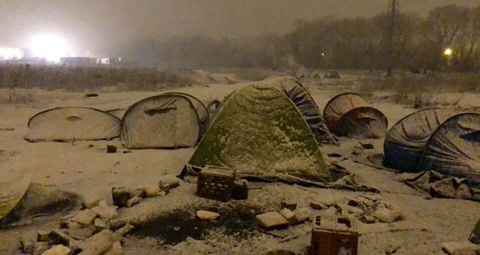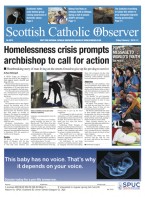BY Ryan McDougall | February 1 | ![]() 0 COMMENTS
0 COMMENTS ![]() print
print

Rumbles from the jungle: how the Church in Scotland is helping desperate refugees
As winter hits the former site of the infamous Calais camp, Ryan McDougall speaks to Justice and Peace Scotland’s Daniel Sweeney about efforts to put the refugees’ plight back into focus.
Justice and Peace Scotland is preparing for what will be the trip of a lifetime to Calais, France to help migrants. In this northern port city, refugees have been trapped, some for more than 20 years, after fleeing persecution in their home countries, in the desperate hope of finding a better life across the Channel in the UK.
Most people will remember ‘The Jungle,’ the name given to the sprawling makeshift refugee camp that sprang up in Calais where, at its peak, more than 10,000 people lingered, waiting for an opportunity of safe passage to the UK, until the camp was bulldozed by the French authorities in 2016.
Since then, most media outlets have become disinterested in the area, but the humanitarian crisis continues.
The refugee population of Calais, as of today, is still thought to total more than 1,000, though the actual figure could be much higher, while many former residents of The Jungle have been scattered around the world, and have by no means found peace.
Policing of the remnants is stricter than ever before, with refugees facing tear gassing, beatings and the destruction of their temporary shelters by teams of enforcers.
From the end of January through to February 9, volunteers from Justice and Peace Scotland will be making the voyage to Calais in a bid to alleviate, through Faith and action, some of the hardships faced by the remaining refugees.
Ahead of their trip, Justice and Peace Scotland coordinator Daniel Sweeney explained what the volunteers hoped to achieve.
As well as offering their services to existing aid organisations in Calais, Mr Sweeney said Justice and Peace Scotland hoped to put the spotlight back on a crisis which the world has largely forgotten about, with many people wrongly believing the situation has been resolved.
Justice and Peace hope volunteers will be able to return to Scotland as eye witnesses to the plight of the Calais refugees, and will then be able to engage others in schools, at home, in parishes, chaplaincies and beyond to encourage support for the aid effort.
Mr Sweeney emphasised that now is a critical time for the displaced of Calais, with their plight gradually worsening.
“It has become policed beyond belief,” he said. “The barbed wire, the batterings, drones—it’s pretty much the case that if you even put up a tent you’ll have it taken down over night. You’ll be woken up, tear gassed and have all your stuff taken.”
Mr Sweeney doesn’t believe that the problem is that people simply do not care about Calais, rather he thinks most people are unaware of the post-Jungle upheaval.
“A part of it for Justice and Peace is to try and bring back some of that consciousness that’s been lost,” he explained.
“The trip will hopefully help us to grow a network who can advocate and who can campaign for Justice and Peace, which is why we purposefully reached out to the schools and such.”
Often, when people think of France, they think of holiday sunshine. But the north of France and the Channel port of Calais has a climate similar to the UK’s, meaning winter can be very cruel for refugees sleeping out.
Ahead of their visit, volunteers from Justice and Peace recently uploaded reminders to social media about how tough the conditions can be.
When The Jungle was full, there were networks of people who would look after one another and see to each others’ needs, even in the face of abject despair.
Today, however, the already displaced have lost all access to such networks of support, Mr Sweeney warned.
“Now, there’ll be a single group who will stay with people from their ethnic country of origin and in those places there’ll be a lack of places to freely communicate,” he said.
Despite this, people have remained true to their faiths.
“Many come from very observantly faithful parts of the world,” said Mr Sweeney, who has previously visited Calais with Bishop William Nolan of Galloway in order to gain an understanding of the severity of the problems faced by the refugees.
He recalled a group of African Catholics who were hopeful of a new life in the UK. He said: “Faith is very much at their core and it’s fascinating to see that.”
He recalled also how the Africans would extend the hand of friendship through prayer. He said: “Most of these guys were from Ethiopia and pray in Ge’ez, an ancient language—I don’t understand a word of it but we prayed alongside them.
“These are guys whose whole life is taken up with this hope, this desperation that they’re going to get to the UK, a safe place.”
There were people who stood out, Mr Sweeney said, including a group of men who had shattered their ankles after being thrown off a vehicle while trying to escape to the UK.
Another man who had failed in a similar escape effort still took time out for his Faith, to give thanks to God for all that he had.
“On calendar days dedicated to Our Lady, this man made a special point of going to morning prayer, even if it was just him,” Mr Sweeney said.
“He would light a morning candle and would be sure that it burnt all the way down as part of the tradition he had back in his home country.
“I think many people in Scotland would really struggle to understand just how important that is to them—it’s all they’ve got, that Faith, that hope that they are going to escape from their persecutors.”
Mr Sweeney previously worked for the Home Office, and knows himself how tough it can be to find a legal route to permanent residence in the UK.
A big reason immigrants want to come to the UK, he said, is that English is spoken around the world to some degree.
Mr Sweeney explained that if he as an English speaker were, in some hypothetical future, to become displaced, he would be ‘far more likely to get into somewhere like America, Canada, or New Zealand,’ because English is his first language.
However, despite refugees’ eagerness to improve their lives, and their English, to find work and settle in the UK, they face immense barriers, and at this time, suffer from public ignorance of their continuing distress.
Nonetheless, other agencies continue to work to alleviate the suffering of the displaced in Calais.
Justice and Peace Scotland volunteers will work with some of those organisations, including the Catholic Worker House, Care 4 Calais and Safe Passage.
- For more information visit www.justiceandpeacescotland.org.uk










